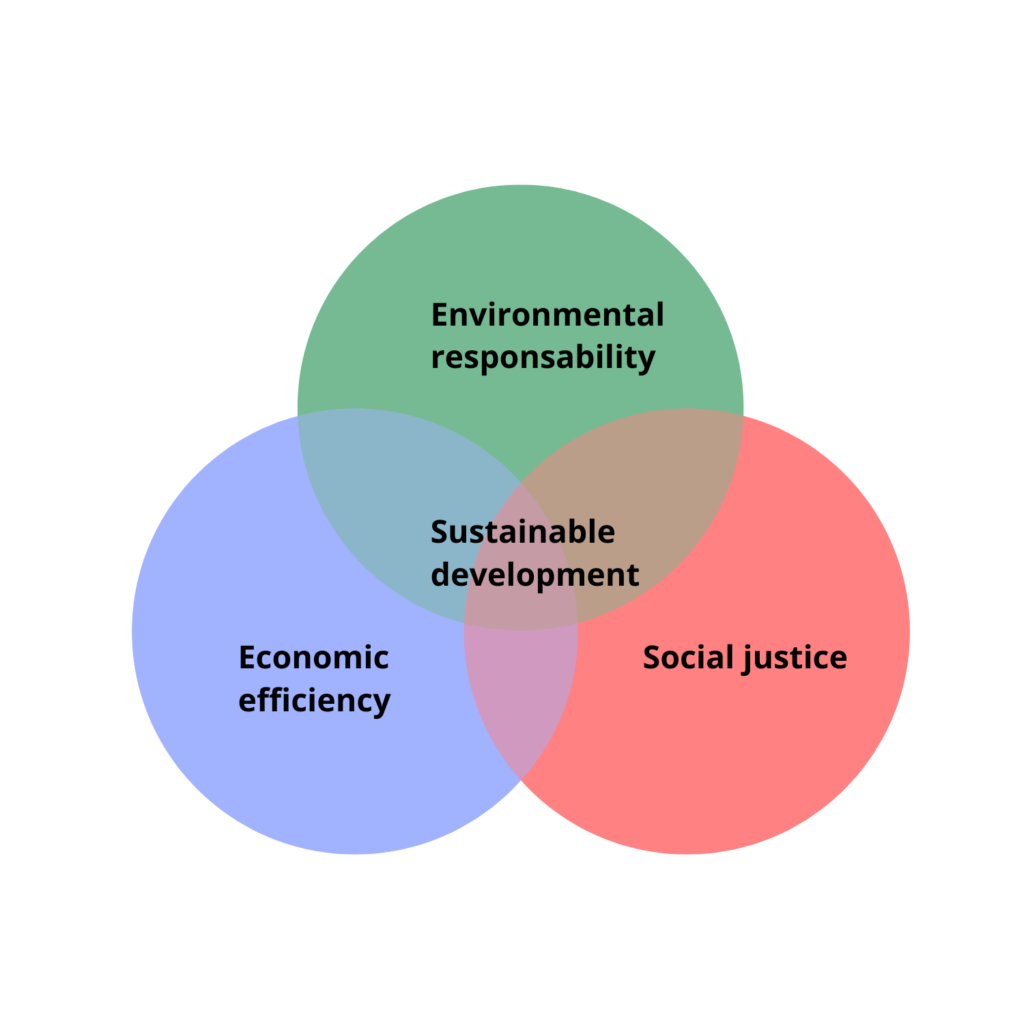Sustainable enterprises are resilient businesses that create economic value, healthy ecosystems and strong communities. These companies survive external crises because they are intimately linked to healthy economic, social and environmental systems.
SUSTAINABLE BUSINESS DEVELOPMENT
Sustainable development is achieved when industrial development adheres to the three principles of economic efficiency, social equity and environmental responsibility. These three elements can be defined as: profits, people and planet.

At the corporate level, sustainable development is often defined as achieving a balanced triple bottom line – a way of managing risks, obligations and opportunities on a financial, social and environmental level.
WHY BE SUSTAINABLE?
The elements of the triple bottom line are interlinked. Companies with a strong environmental and social focus also have superior leadership and financial performance. Furthermore, these companies attract and retain employees more easily and are exposed to lower financial and reputational risks. Finally, these companies are innovative and adaptable.
KEY ELEMENTS OF SUSTAINABLE DEVELOPMENT
To be sustainable, industrial development must respond to three major macroeconomic challenges:
| Principles | Challenges |
|---|---|
| Economic efficiency | Innovation Prosperity Productivity |
| Social equity | Community Health and well-being Human Rights Fair sharing of resources and risks |
| Environmental responsibility | Climate change Spatial planning Water quantity and quality Biodiversity Responsible use of renewable and non-renewable resources |
Businesses play a crucial role in promoting sustainable development. By addressing these issues, they positively influence their triple bottom line, which includes their financial, social and environmental activities.
Some of the actions taken by companies contribute to sustainable development and their triple bottom line, as shown in the table below:
| Economic | Social | Environment |
|---|---|---|
| Profit | Employee health and safety | Utilisation of resources |
| Costs | Sustainable value chains | Noise, odours and traffic |
| Stock value | Governance (e.g. diversity, EPR, transparency) | Noise, odours and traffic |
| Social support and legitimacy | Responsible product management, also at end of life | |
| Staff remuneration | ||
| Philanthropy |
WHAT ACTIONS CAN SUSTAINABLE COMPANIES TAKE?
A number of good practices can help companies strengthen their sustainability and thus move from follower to leader in this field.
Stakeholder engagement: Organisations can learn from their customers, employees and surrounding communities. Mobilising does not only mean conveying messages, but also understanding opposing viewpoints, comparing opinions, finding common ground and involving stakeholders in a common decision-making process.
Environmental management systems: these systems provide the structures and processes that allow environmental efficiency to be incorporated into corporate processes and culture, mitigating risks. ISO 14001 certification is the most widely recognised standard worldwide, but there are many others. Indeed, there are sector-specific standards, e.g. Responsible Care for the chemical industry the EU Eco-Management and Audit Scheme EMAS.
Reporting and disclosure: Measurement and monitoring activities are fundamental to the creation of stable sustainable development practices. Through them, organisations can not only collect and compare data, but also present a complete picture of transparency to external stakeholders. The Global Reporting Initiative’s 3G Guidelines are one of many examples of reliable sustainability reporting standards.
Life cycle assessment (LCA): Organisations that want to make a big step forward should systematically analyse the environmental and social impacts of the products they use and produce, including through life cycle assessments that allow them to measure their impacts in great detail.
EXAMPLES OF SUSTAINABLE COMPANIES
Which companies can claim to be sustainable? To find out which companies are at the top of this ranking, let’s take a look at the Corporate Knights Global 100. This ranking analyses the most sustainable listed companies in the world with gross sales of at least 1 billion. Among the criteria used to compile the list are KPIs such as resource management, investment in R&D, women in management positions and revenue.
Among the criteria used to compile the list are KPIs such as resource management, investment in R&D, female presence in management positions and revenues from green goods and services.
These are the companies that occupy the top positions:
1. Orsted A/S
First place goes to this Danish renewable energy company. In just 10 years, Orsted has changed a business model that used 85% fossil fuels in its processes. In doing so, it has gone from working with oil and natural gas to setting itself the challenge of achieving zero carbon emissions by 2025.
Overall score: 85.2%.
2. Chr. Hansen Holding A / S
Denmark is at the forefront of sustainability policies and the results are reflected in its companies. In second place in the ranking is a sustainable chemicals and nutrition company whose aim is to use natural ingredients in food production. Crops and enzymes, natural dyes, plant protection products and probiotics are some of its products.
Overall score: 83.9%.
3. Neste Oyj
The three most sustainable companies in the world come from Northern Europe. Finland’s Neste Oyj works with oil refineries, but does so as a world leader in the production of renewable diesel. In the 2000s it started its corporate turnaround, which was realised with the NEXBTL technology. Through its use, it transforms fats into molecules that replace fossil materials in fuel production.
Overall score: 83.6%.
8. Enel Group
Jumping to eighth place, we find the first Italian company in the ranking. Since the 1970s, Enel has been a pioneer in the use of renewable energy. In 2004, it joined the UN Global Compact, an initiative that allows companies to incorporate policies on human rights, the environment and labour legality. With the Open Power project, they want to bring energy and new technologies to the poorest regions of the planet.
Overall score: 81.77



